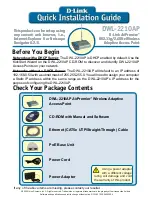
94
DI-624M User’s Manual
D-Link Systems, Inc.
Appendix
H
H.323 – A standard that provides consistency of voice and video transmissions and compatibility for
videoconferencing devices
Half-duplex – Data cannot be transmitted and received at the same time
Hashing – Transforming a string of characters into a shorter string with a predefined length
Hexadecimal – Characters 0-9 and A-F
HomePNA – Networking over telephone lines
HomeRF – Networking standard that combines 802.11b and DECT (digital Enhanced Cordless
Telecommunication) that provides speeds up to 1.6 Mbps and a distance of 150 ft using a Frequency Hopping
transmission method
Hop – The action of data packets being transmitted from one router to another
Host – Computer on a network
HTTP – Hypertext Transfer Protocol is used to transfer files from HTTP servers (web servers) to HTTP clients
(web browsers)
HTTPS – HTTP over SSL is used to encrypt and decrypt HTTP transmissions
Hub – A networking device that connects multiple devices together
I
ICMP – Internet Control Message Protocol
IEEE – Institute of Electrical and Electronics Engineers
IETF – Internet Engineering Task Force
IGMP – Internet Group Management Protocol is used to make sure that computers can report their multicast
group membership to adjacent routers
IIS – Internet Information Server is a WEB server and FTP server provided by Microsoft
IKE – Internet Key Exchange is used to ensure security for VPN connections
Infrastructure – In terms of a wireless network, this is when wireless clients use an Access Point to gain
access to the network
Internet – A system of worldwide networks which use TCP/IP to allow for resources to be accessed from
computers around the world
Internet Explorer – A World Wide Web browser created and provided by Microsoft
Internet Protocol – The method of transferring data from one computer to another on the Internet
Internet Protocol Security – IPsec provides security at the packet processing layer of network communication
Internet Service Provider – An ISP provides access to the Internet to individuals or companies
Interoperability – The ability for products to interact with other products without much customer interaction
Intranet – A private network
Intrusion Detection – A type of security that scans a network to detect attacks coming from inside and outside
of the network
IP – Internet Protocol
IP address – A 32-bit number, when talking about Internet Protocol Version 4, that identifies each computer
that transmits data on the Internet or on an Intranet











































